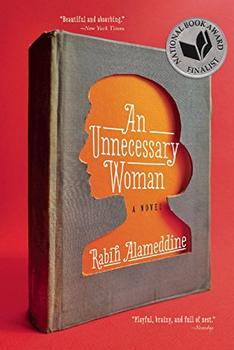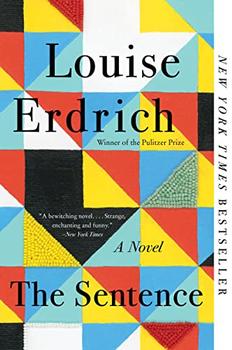Summary | Excerpt | Reviews | Beyond the book | Read-Alikes | Genres & Themes | Author Bio

"You could say I was thinking of other things when I shampooed my hair blue, and two glasses of red wine didn't help my concentration," says Aaliyah Sohbi. So begins Rabih Alameddine's novel An Unnecessary Woman: a love affair, an impassioned tribute to music and art, to Aaliyah's beloved city of Beirut, where the story is set, and, above all, to her one great passion in life, books. The story, written as a first person address, is set in present-day Beirut, spanning the space between Christmas and New Year's Day. Inside this timeframe, we follow Aaliyah as she reminiscences about her life, the life of her city, and the troubled history of Lebanon's fifteen-year civil war (see Beyond the Book) and ensuing conflicts with "its sister pigmy state," Israel.
Aaliyah, seventy-two, lives in a tiny, run-down apartment filled with books, a few sparse furnishings, and a collection of "various relics" that symbolize important events in her life. As the story opens, we are in the last days of the year. She has just completed a translation into Arabic of W.G. Sebald's Austerlitz and is contemplating the subject of her next project. For the last fifty years, she has begun a new translation every January 1st; she has completed thirty-seven. Her ritual on completion - and Aaliyah is a woman of ritual - is to make final corrections, place the pages in a box, and then imbibe two glasses of red wine. No one ever reads the translations; the boxes are stacked in the back rooms of her apartment. Quoting Fernando Pessoa's The Book of Disquiet, she says, "The only attitude worthy of a superior man is to persist in an activity he recognizes is useless." This is how Aaliyah sees her own destiny: "Books into boxes – boxes of paper, loose translated sheets. That's my life."
Childless, "plucked out of school" short of her sixteenth birthday to be married off, divorced at twenty, Aaliyah's family sees her as "its unnecessary appendage." Of course nothing could be further from the truth. Aaliya, whose name means "the high one, the above," is a brilliant voice. By turns whimsical, philosophical, and ranting, she expounds on her theories of literature and artistic creation, bemoans the loss of youth - "to age is to whine" - and reflects on the events that have brought her to this place. She has retired after fifty years managing a small bookstore that sells an eclectic mix of rare books, classics, and whatever else finds its way inside. She is on the cusp of a new year, a new translation.
Aaliyah guards her solitude savagely. Other than intrusions by "the three witches," a colorful coffee clutch of three women who live above her, she has allowed only two people into her heart. The most important is her friend Hannah, long deceased:
Remembering Hannah, my one intimate, is never easy. I still see her before me at the kitchen table, her plate wiped clean of food, her right cheek resting on the palm of her hand, head tilted slightly, listening, offering that rarest of gifts: her unequivocal attention. My voice had no home until her. During my seventy-two years, she was the one person I cared for, the one I told too much – boasts, hates, joys, cruel disappointments, all jumbled together.
The second person is Ahmad, a young Palestinian boy from the Sabra refugee camp, who wanders wide-eyed into her bookstore one day and comes to share her lust for literature. Like Aaliyah, his fate is shaped by the civil war that consumed Lebanon between 1975 and 1990.
The war is an undercurrent of the novel, always simmering beneath the surface. For fifteen years, it determined the course of Aaliyah's life, looming over her quotidian existence. "I was reading by candlelight," she says, "while people killed each other outside my window." She reminisces about the war's effects with both wisdom and humor. For protection, she sleeps with an assault rifle. "The burning city, what a time. I have to mention here that just because I slept with an AK-47 in place of a husband during the war does not make me insane...Someone shat in my home. I procured a Kalashnikov."
Just as the war is ever-present, so, too, is the city where Aaliyah has lived for the seventy-two years of her life. Beirut appears as a character in the novel – morphing, growing, dying and being reborn. "Beirut is the Elizabeth Taylor of cities: insane, beautiful, tacky, falling apart, aging, and forever drama laden. She'll also marry any infatuated suitor who promises to make her life more comfortable, no matter how inappropriate he is."
It is no accident that Austerlitz, the book Aaliyah has just finished translating, is a work of "historiographic metafiction," or that three other authors who feature prominently in her musings - Paul Auster, Fernando Pessoa, and Italo Calvino - are writers of metafictional works. The author's presence in An Unnecessary Woman is transparently and unashamedly paired with the voice of Aaliyah, a metafictional note. In lesser hands, the far-ranging dissertations might have seemed like authorial preening, but in part because of Aaliyah's rich voice and in part because of the sheer brilliance of her words, the reader is charmed into complete acceptance. By the time I finished the novel, my "must read" list had doubled in size.
"Most of the books published these days consist of a series of whines followed by an epiphany," Aaliyah complains. And yet, with a playful nod, Alameddine's novel turns on Aaliyah's epiphanies, a series of gentle revelations in the latter half of the work followed by a final uplifting shift that involves a new light shining on the body and purpose of her work.
An Unnecessary Woman is not a novel that keeps the reader turning pages. Rather it is a work whose every page is to be savored, to be read and read again. When the last page is turned, both heart and mind will be richer for it.
![]() This review was originally published in The BookBrowse Review in February 2014, and has been updated for the
January 2015 edition.
Click here to go to this issue.
This review was originally published in The BookBrowse Review in February 2014, and has been updated for the
January 2015 edition.
Click here to go to this issue.

If you liked An Unnecessary Woman, try these:

by Chris Bachelder, Jennifer Habel
Published 2024
A startlingly original, incantatory novel about marriage, mortality, and making art.

by Louise Erdrich
Published 2022
In this stunning and timely novel, Pulitzer Prize and National Book Award–winning author Louise Erdrich creates a wickedly funny ghost story, a tale of passion, of a complex marriage, and of a woman's relentless errors.
Your guide toexceptional books
BookBrowse seeks out and recommends the best in contemporary fiction and nonfiction—books that not only engage and entertain but also deepen our understanding of ourselves and the world around us.